When you enter a courtroom, strict rules govern mobile camera use. Generally, photography and recording are prohibited without prior authorization. You'll need explicit permission from the judge or court administrator to use your device for capturing images or audio. Even with approval, certain areas like the jury box and witness stand are off-limits. Violating these rules can result in serious consequences, including contempt charges, fines, or device confiscation. Media professionals must obtain proper accreditation and follow specific guidelines. Remember to take into account privacy concerns and the potential impact on court proceedings. Understanding the nuances of these regulations is vital for anyone maneuvering the complexities of courtroom documentation.
Court Photography Restrictions
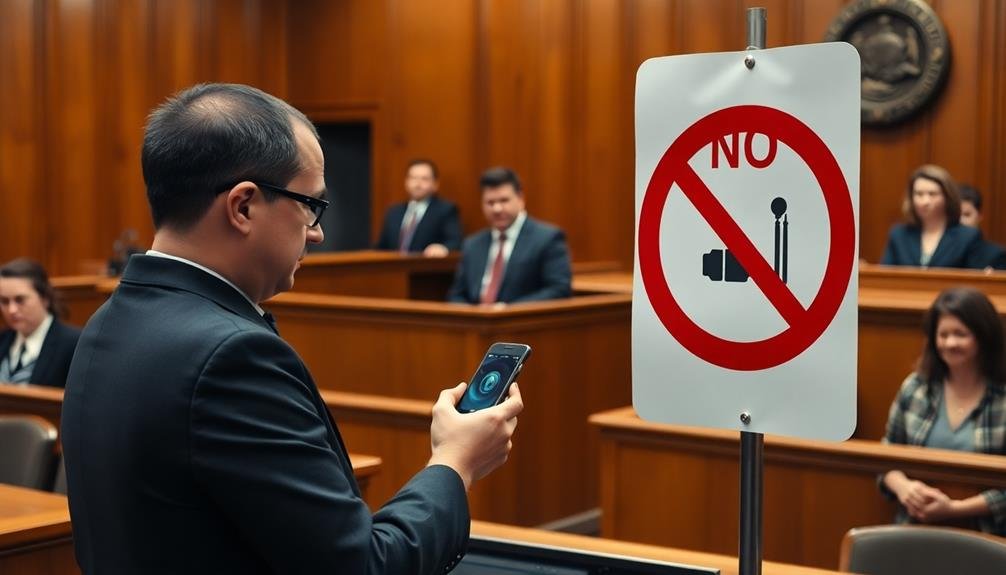
Anyone entering a courtroom should be aware of strict photography restrictions. In most jurisdictions, you're prohibited from taking photos or videos inside courtrooms without prior authorization. These rules aim to protect the privacy of individuals involved in legal proceedings and maintain the integrity of the judicial process.
You'll typically find signs clearly stating photography bans at courthouse entrances and inside courtrooms. Violating these rules can result in serious consequences, including contempt of court charges, fines, or even arrest. If you're caught using your mobile device to capture images, security personnel may confiscate it.
There are some exceptions to these restrictions. In certain cases, judges may grant permission for media coverage or allow photography for specific purposes. However, you must obtain explicit approval beforehand.
Even if permitted, you'll likely face limitations on what you can photograph and when.
Authorized Personnel and Devices
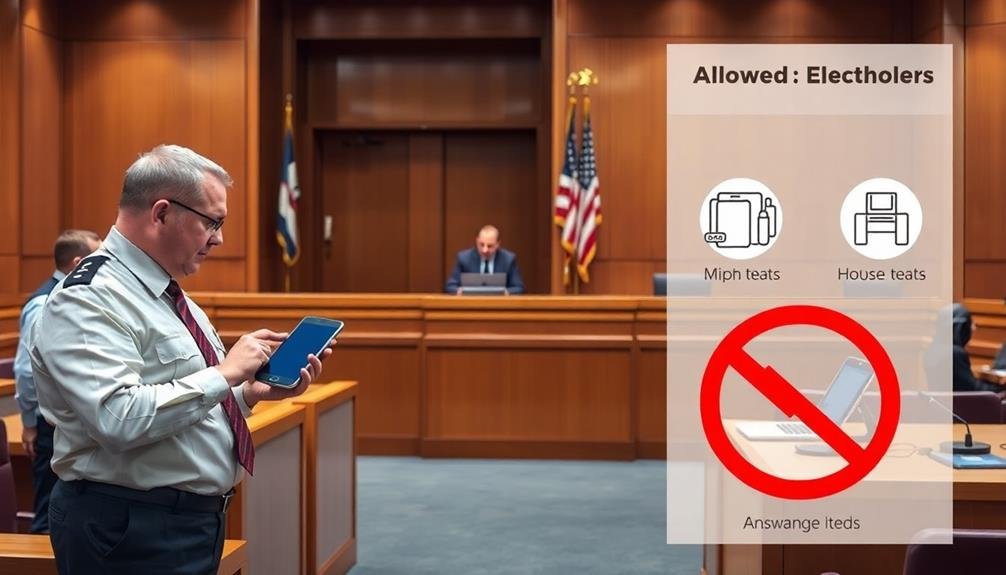
Within courtrooms, only select individuals are permitted to use mobile devices for photography or recording.
You'll find that authorized personnel typically include official court photographers, credentialed members of the press, and court-appointed videographers. These individuals must obtain prior approval from the judge or court administrator before using their devices.
If you're a legal professional, you might be allowed to use your mobile device for work-related purposes, but not for capturing images or audio.
Court staff, such as clerks and bailiffs, may also have limited permissions for device use during proceedings.
The types of authorized devices vary by jurisdiction. Some courts allow only professional-grade cameras and recording equipment, while others permit smartphones or tablets with specific restrictions.
You'll need to check the local rules, as they can differ markedly between courts.
Pre-Trial Approval Process
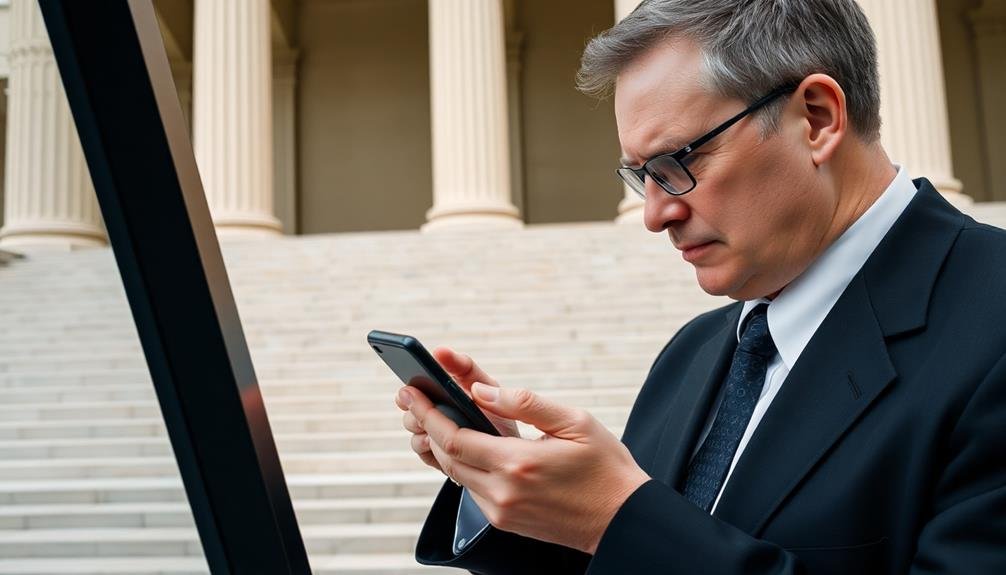
Before seeking permission to use a mobile camera in court, you'll need to navigate the pre-trial approval process. This typically begins with submitting a formal request to the court clerk or designated official.
You'll need to provide detailed information about your intended use, including the type of device, purpose of recording, and specific proceedings you wish to document.
Your request should outline your credentials, affiliations, and reasons for needing camera access. Be prepared to explain how your recording will benefit the public interest or serve a legitimate purpose without disrupting court proceedings.
You may need to sign an agreement acknowledging court rules and restrictions on camera use.
The judge presiding over the case will review your request and may consult with involved parties. They'll consider factors such as privacy concerns, potential impacts on witnesses or jurors, and the nature of the case.
If approved, you'll receive written authorization specifying allowed equipment and any limitations on use.
Prohibited Areas Within Courtrooms
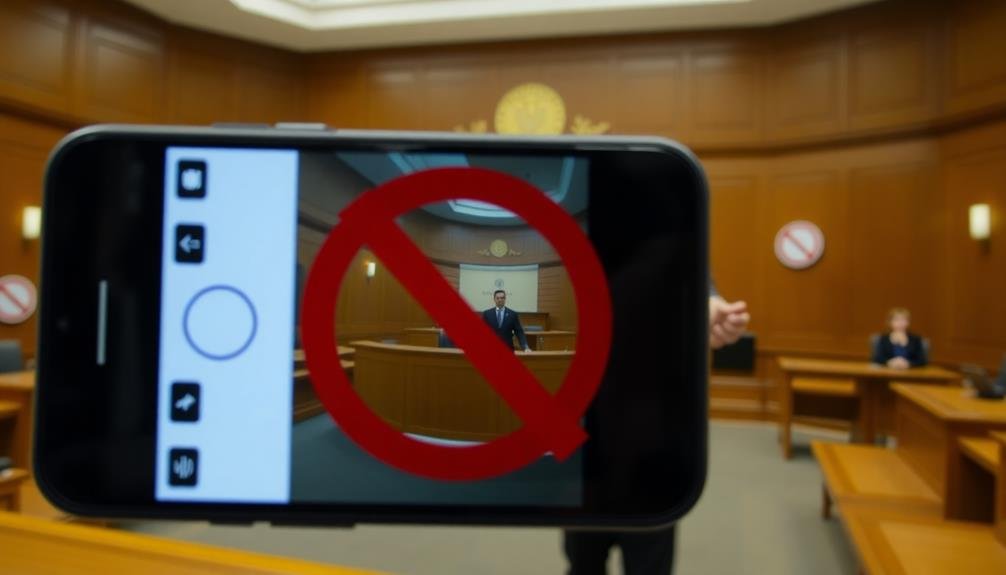
Even with court approval, you'll find that certain areas of the courtroom are strictly off-limits for mobile camera use. These restrictions protect privacy, maintain order, and guarantee fair proceedings. You're typically prohibited from capturing images or video of the jury box, witness stand, and judge's bench. Additionally, you can't photograph or record confidential conversations between attorneys and clients.
Here's a quick reference guide for prohibited areas and allowed zones:
| Prohibited Areas | Allowed Zones |
|---|---|
| Jury Box | Public Gallery |
| Witness Stand | Media Area |
| Judge's Bench | Entrance/Exit |
| Attorney-Client Areas | Hallways |
| Clerk's Station | Lobby |
Witness Protection Considerations
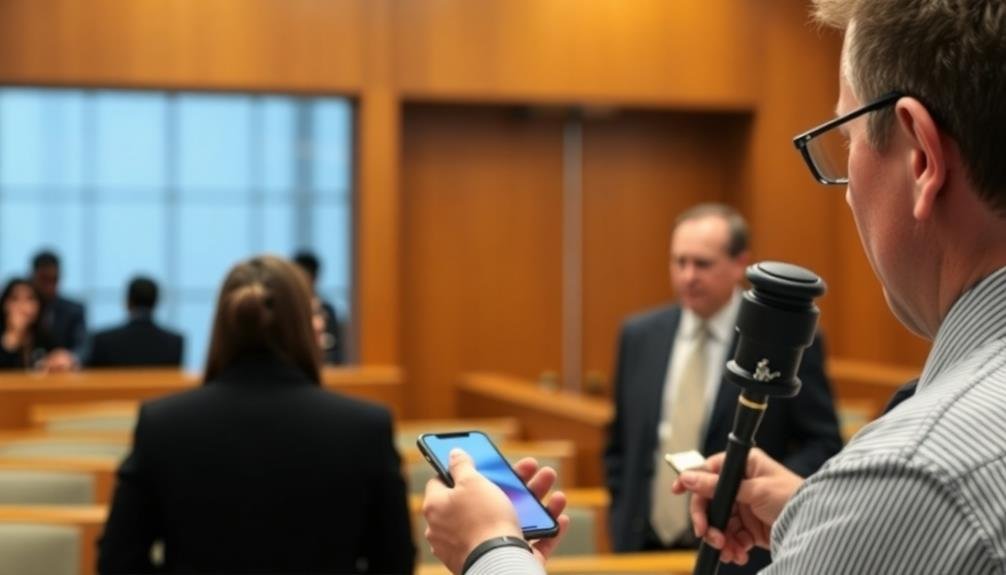
When it comes to mobile camera use in courtrooms, witness protection is a paramount concern. You must be aware that capturing images or videos of protected witnesses can jeopardize their safety and the integrity of legal proceedings.
Courts take this matter seriously and have stringent rules in place to safeguard vulnerable individuals.
To guarantee witness protection, you should adhere to the following guidelines:
- Never attempt to photograph or record protected witnesses
- Respect any signage or instructions regarding restricted areas
- Turn off your device completely if requested by court officials
- Be prepared to surrender your mobile device upon entry
- Report any suspicious photography or recording activities
Jury Privacy Regulations
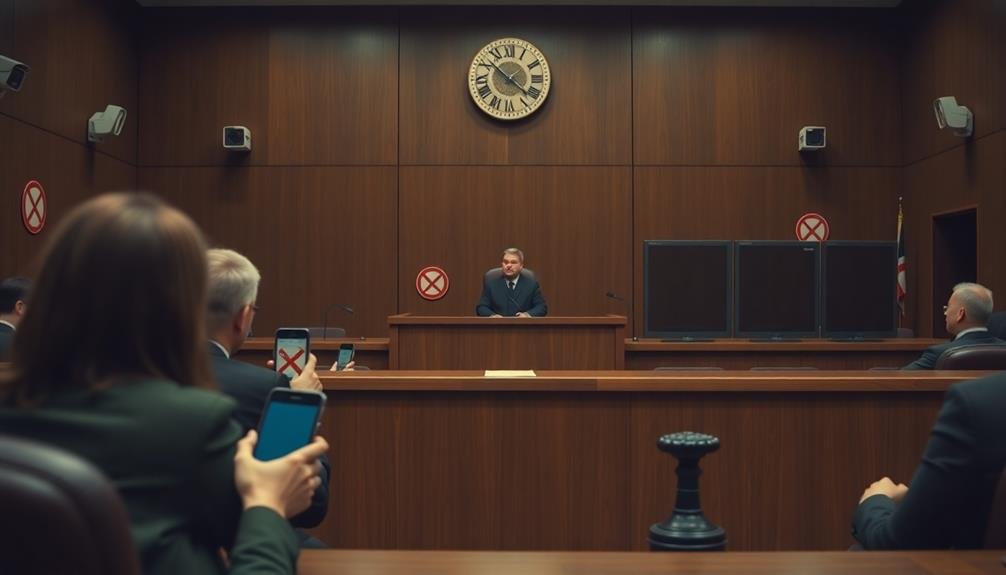
You'll find strict regulations in place to protect juror privacy during trials.
Courts often implement measures to maintain juror anonymity, such as using numbers instead of names and limiting personal information disclosure.
Additionally, you'll typically see restrictions on jurors' smartphone use, including bans on photography and social media posting, to prevent compromising the integrity of the judicial process.
Juror Anonymity Protection Measures
Many jurisdictions have implemented strict regulations to safeguard juror privacy and protect them from undue influence or harassment.
You'll find that these measures are designed to maintain the integrity of the judicial process and guarantee jurors can perform their duties without fear of reprisal.
Courts often employ various anonymity protection measures, including:
- Restricting access to juror personal information
- Prohibiting photography or video recording of jurors
- Using number identifiers instead of names
- Providing secure entrances and exits for jurors
- Limiting media coverage of juror selection processes
You should be aware that violating these regulations can result in severe penalties, including fines and contempt of court charges.
If you're attending a trial, you're expected to respect juror privacy by refraining from attempting to identify or contact them.
This includes avoiding social media posts or discussions about jurors you may recognize.
Smartphone Restrictions for Jurors
Smartphone restrictions for jurors have become increasingly important in maintaining jury privacy and integrity. As a juror, you'll likely be prohibited from using your smartphone during trial proceedings and deliberations. Courts typically require you to turn off your device or leave it in a secure location outside the courtroom.
These restrictions serve multiple purposes:
| Purpose | Explanation |
|---|---|
| Prevent distractions | Guarantee focus on trial |
| Maintain impartiality | Avoid external influences |
| Protect privacy | Prevent sharing of case details |
You're not allowed to use your smartphone to research case-related information, communicate with others about the trial, or post updates on social media. Violating these rules can result in serious consequences, including being held in contempt of court or causing a mistrial.
During breaks, you may be permitted limited phone use for personal matters unrelated to the case. However, you must adhere to strict guidelines provided by the court. Remember, your role as a juror requires maintaining confidentiality and impartiality throughout the entire trial process. By following these smartphone restrictions, you're contributing to the fairness and integrity of the legal system.
Audio Recording Limitations
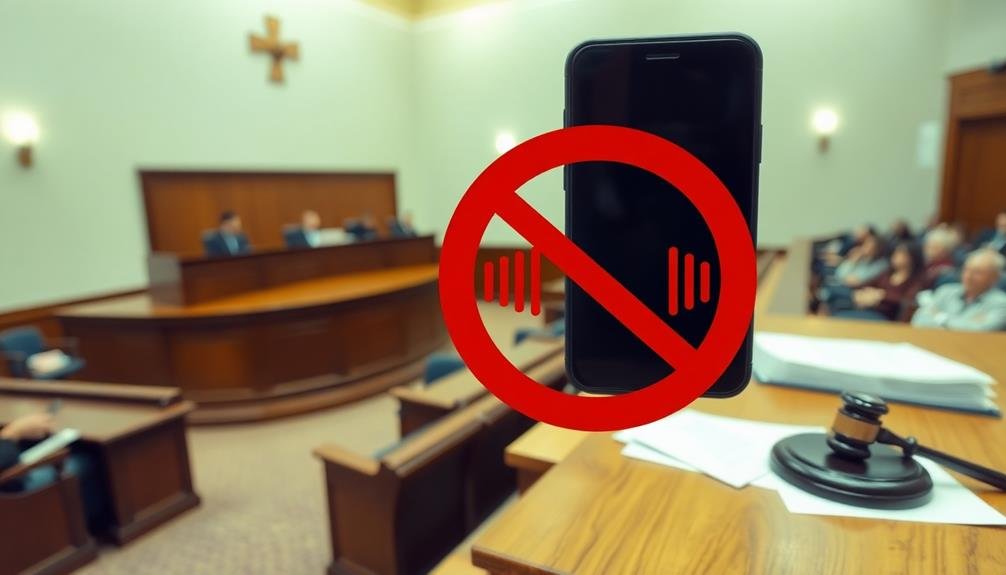
The legality of audio recording with mobile devices can be a minefield for unwary users.
You'll need to navigate complex laws that vary by jurisdiction and situation. In most cases, it's illegal to record conversations without the consent of at least one party involved. Some states require all parties to consent, making the rules even stricter.
When it comes to court proceedings, audio recording is typically prohibited unless you've obtained explicit permission from the judge.
This rule extends to all areas of the courthouse, including hallways and lobbies. Violating these restrictions can result in severe consequences, including contempt of court charges.
To stay on the right side of the law, keep these points in mind:
- Always seek permission before recording in court
- Be aware of your state's consent laws for private conversations
- Never record jury deliberations or attorney-client discussions
- Turn off your device's audio recording features when entering court
- Consider alternatives like note-taking for personal reference
Social Media Posting Guidelines
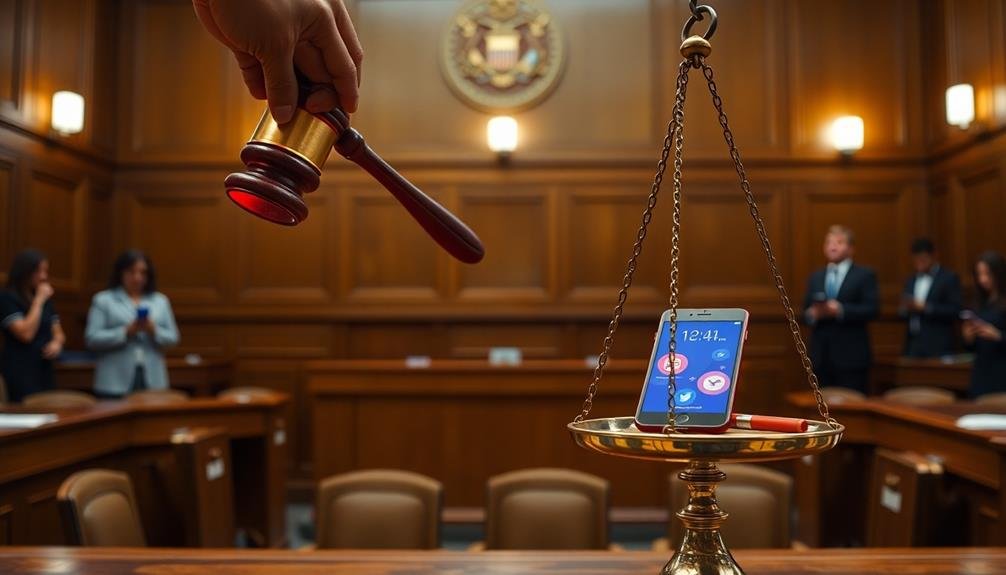
When posting mobile camera content on social media, you'll need to be aware of prohibited content restrictions specific to each platform.
It's essential to practice ethical sharing by obtaining consent from individuals featured in your photos or videos before posting.
Always consider privacy implications, ensuring you're not inadvertently revealing sensitive information or violating someone's reasonable expectation of privacy.
Prohibited Content Restrictions
Social media platforms often impose strict content guidelines to protect users and maintain a safe online environment. When posting content related to court proceedings, you'll need to be aware of these restrictions to avoid having your posts removed or your account suspended.
Most platforms prohibit the following types of content:
- Explicit violence or gore
- Nudity or sexually suggestive material
- Hate speech or discriminatory content
- Personal information without consent
- Copyrighted material without permission
You should always review the specific guidelines of each platform before posting court-related content. Remember that even if you're allowed to capture images or videos in court, sharing them online may still violate platform rules or legal restrictions.
Be particularly cautious when posting content involving minors, victims of crimes, or sensitive legal proceedings. Even if you've obtained permission to record, you may need additional consent to share that content on social media.
When in doubt, consult with a legal professional or the court's media liaison before posting any court-related content on social media platforms. This will help you avoid potential legal issues and guarantee you're respecting the privacy and rights of all parties involved.
Ethical Sharing Practices
Sharing content from court proceedings on social media requires careful consideration of ethical guidelines. You should always prioritize the integrity of the judicial process and respect for all parties involved. Before posting anything, verify you have permission from the court and comply with any restrictions on recording or photography.
When sharing court-related content, follow these best practices:
| Do | Don't | Consider |
|---|---|---|
| Verify information accuracy | Share sensitive details | Impact on ongoing cases |
| Respect privacy of witnesses | Post without context | Potential jury influence |
| Use neutral language | Make inflammatory comments | Ethical implications |
Be mindful of the potential consequences of your posts. Sharing misinformation or biased content can undermine public trust in the justice system. Always provide context and avoid sensationalizing court proceedings.
Remember that your social media activity can be subject to legal scrutiny. Violating court rules or ethical guidelines may result in penalties, including contempt of court charges. When in doubt, consult with legal professionals or court officials before sharing any court-related content on social media platforms.
Privacy Considerations
Privacy should be at the forefront of your mind when posting court-related content on social media. Before sharing any images or videos from court proceedings, consider the potential consequences for all parties involved. Remember that even if you're allowed to take photos or videos, you mightn't have the right to share them publicly.
When posting court-related content on social media, follow these guidelines:
- Avoid sharing identifiable information about jurors, witnesses, or victims
- Don't post images of minors involved in court cases
- Refrain from sharing sensitive documents or evidence
- Respect the privacy of court staff and other attendees
- Consider the potential impact on ongoing legal proceedings
Be aware that some courts have specific rules about social media use during trials. Violating these rules can lead to serious consequences, including contempt of court charges. If you're unsure about what you can share, consult with court officials or a legal professional.
Always prioritize the integrity of the judicial process and the privacy rights of individuals over your desire to share information online. By being mindful of privacy considerations, you'll help maintain the fairness and impartiality of the court system.
Penalties for Violating Court Rules
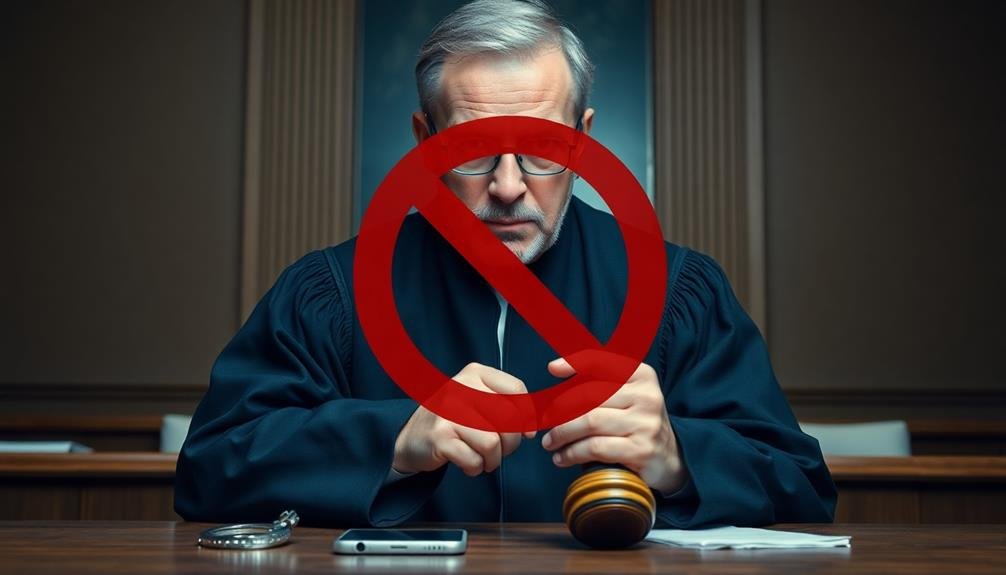
Violating court rules regarding mobile camera use can lead to severe consequences. You'll face sanctions ranging from fines to imprisonment, depending on the severity of your offense.
If you're caught taking photos or videos in a courtroom without permission, you could be held in contempt of court. This charge may result in hefty fines, up to several thousand dollars, or even jail time.
In some cases, you might have your device confiscated or be banned from future court proceedings. If you're an attorney, you risk disciplinary action from the bar association, potentially jeopardizing your legal career.
For journalists, violating these rules could lead to loss of press credentials and damage to your professional reputation.
Sharing unauthorized images or recordings on social media can amplify the penalties. You may face additional charges for disseminating confidential information or interfering with due process.
In high-profile cases, violating camera rules could result in a mistrial, leading to even more serious legal consequences.
Exceptions for High-Profile Cases
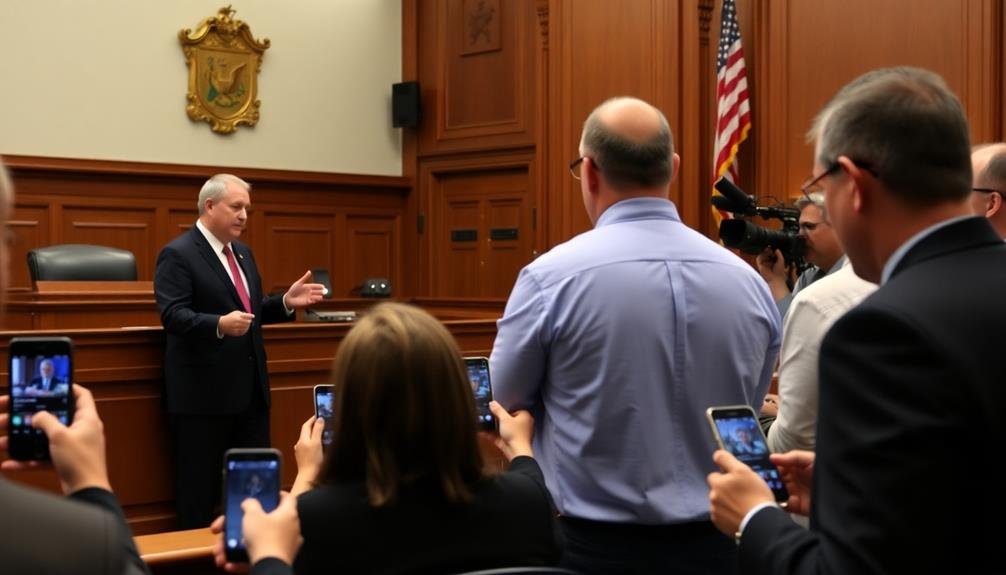
High-profile court cases often come with their own set of rules regarding mobile camera use. You'll find that judges may make exceptions to standard policies, allowing limited photography or recording in these instances. This is due to the heightened public interest and media attention surrounding such cases.
When attending a high-profile trial, you might encounter the following exceptions:
- Designated media areas for approved journalists
- Specific time windows for photography before proceedings begin
- Live-streaming of certain portions of the trial
- Permission for courtroom sketches
- Limited use of silent cameras during key moments
These exceptions aren't guaranteed, and you'll need to follow strict guidelines if they're granted. You must respect the court's authority and comply with any restrictions imposed.
Remember, the judge's primary concern is maintaining order and ensuring a fair trial.
If you're granted special access, you'll be expected to share your footage or images with other media outlets. This pool system helps manage the number of cameras in the courtroom while still providing coverage.
Always check the specific rules for each high-profile case, as they can vary notably depending on the circumstances and the presiding judge's preferences.
Media Accreditation Requirements
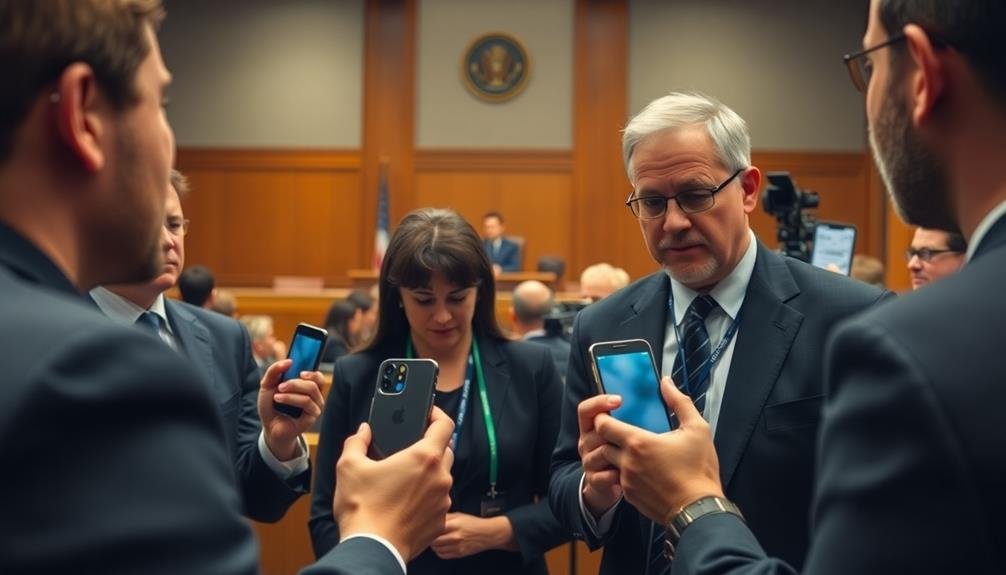
Journalists seeking to cover court proceedings with mobile cameras must navigate a maze of media accreditation requirements.
You'll need to start by contacting the court's media liaison or public information officer to inquire about their specific accreditation process. Most courts require you to submit an application, which typically includes your professional credentials, media outlet information, and the reason for your coverage request.
You'll likely need to provide proof of your journalistic status, such as a press pass or letter from your employer. Some courts may also require you to complete a training session on courtroom etiquette and mobile camera usage guidelines.
Be prepared to submit your equipment for inspection to guarantee it meets the court's standards for non-disruptive recording.
Once accredited, you'll receive a court-issued badge or identification that must be displayed at all times. Remember, accreditation isn't guaranteed and can be revoked if you violate court rules.
Always follow the judge's instructions regarding when and where you can use your mobile camera. Familiarize yourself with any restrictions on filming certain witnesses, jurors, or sensitive proceedings.
Ethical Considerations for Courtroom Photography
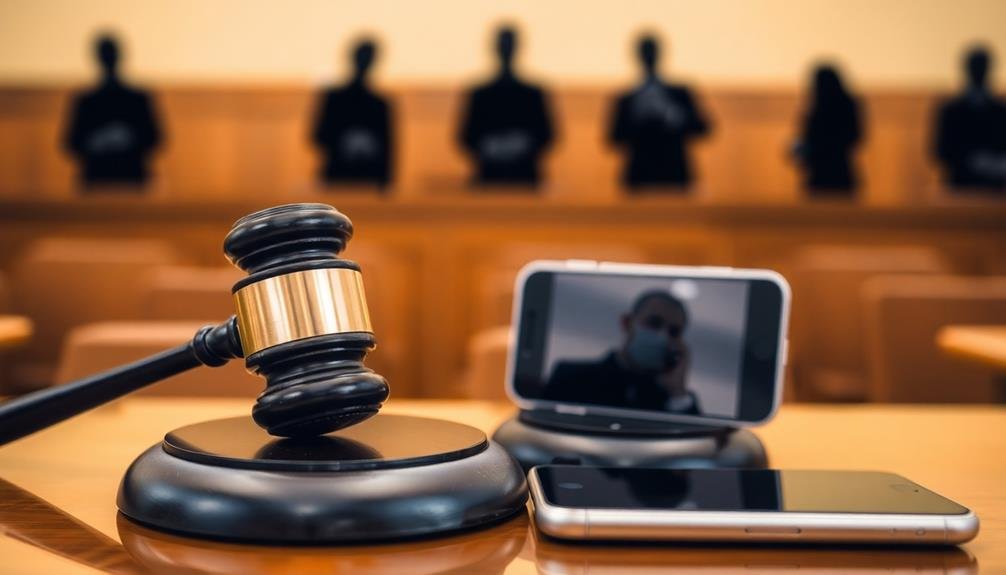
When considering courtroom photography, you'll need to balance privacy concerns with the public's right to information.
You must respect the dignity of all participants, including defendants, witnesses, and jurors, while capturing the essence of the proceedings.
It's essential to evaluate how your photography might impact the trial, ensuring it doesn't distract or influence the court's activities.
Privacy vs. Public Interest
Balancing privacy rights with the public's right to know presents a significant challenge in courtroom photography. You'll need to contemplate both sides carefully when determining whether to allow cameras in the courtroom.
On one hand, individuals involved in legal proceedings have a right to privacy, especially in sensitive cases. On the other, transparency in the justice system is vital for maintaining public trust and accountability.
When weighing these competing interests, reflect on the following factors:
- The nature of the case (civil vs. criminal)
- The potential impact on victims, witnesses, and jurors
- The public's interest in the proceedings
- The potential for media sensationalism
- The court's ability to maintain order and decorum
You'll need to strike a delicate balance between protecting individual privacy and serving the public interest.
In some cases, you might opt for limited camera access, such as allowing photography only during specific portions of the trial. Alternatively, you could require media outlets to pool their resources and share footage to minimize disruption.
Dignity of Participants
Courtroom participants deserve to have their dignity preserved, even in the presence of cameras. When you're capturing images or videos in court, you must be mindful of how your actions might affect those involved in the proceedings. Remember that defendants, witnesses, and victims are often experiencing significant stress and vulnerability.
You should avoid photographing or recording individuals in distress, such as those crying or visibly upset. Be cautious about capturing images that could be embarrassing or compromising, like unflattering facial expressions or body language.
It's essential to respect the privacy of minors and protected witnesses by refraining from photographing them altogether.
Consider the potential long-term impact of your images on the participants' lives. A moment captured in court could follow someone for years, affecting their personal and professional relationships.
You're responsible for using discretion and ethical judgment when deciding what to photograph and share. By prioritizing the dignity of courtroom participants, you'll contribute to a fair and respectful legal process while still fulfilling your role as a visual documentarian of court proceedings.
Impact on Proceedings
Minimizing disruption is essential when photographing court proceedings. You'll need to be mindful of how your actions might impact the legal process. Remember, your presence shouldn't interfere with the administration of justice or the rights of those involved.
When using mobile cameras in court, consider these key points:
- Silence all device sounds to avoid distracting participants
- Use non-flash photography to prevent startling witnesses or jurors
- Position yourself discreetly to maintain courtroom decorum
- Respect any specific instructions given by the judge or court officials
- Be prepared to stop recording immediately if requested
Your camera use shouldn't impede the flow of proceedings or create an atmosphere of intimidation. Be aware that your actions could potentially influence witness testimony or juror behavior.
If you're unsure about the appropriateness of taking a photo, err on the side of caution. Courts may have varying rules regarding mobile camera use, so it's vital to familiarize yourself with local regulations beforehand.
Frequently Asked Questions
Can I Use My Smartwatch to Take Photos in Court?
You shouldn't use your smartwatch to take photos in court. It's generally not allowed and could get you in trouble. Courts have strict rules about electronic devices and photography. Always check the specific court's policies beforehand.
Are There Different Rules for Sketching Versus Photographing in Courtrooms?
Yes, there are different rules. You're often allowed to sketch in courtrooms, but photography's usually prohibited. Sketching's seen as less disruptive and doesn't capture exact likenesses. Always check specific court rules before attempting either activity.
How Do Court Photography Rules Differ for Minors Involved in Cases?
You'll find that court photography rules are stricter for minors. You can't photograph or identify them in most cases. Courts often prohibit any images of juvenile proceedings to protect children's privacy and future prospects.
Can Courthouse Exterior Photos Be Taken Without Permission?
You can usually take photos of courthouse exteriors without permission. It's considered public space. However, be aware of any posted restrictions or security concerns. Always respect privacy and avoid photographing individuals without their consent.
Are There Special Considerations for Photographing Cultural or Religious Items in Court?
You should be cautious when photographing cultural or religious items in court. It's best to ask for permission first, as there may be specific rules or sensitivities surrounding these objects. Always respect cultural and religious practices.
In Summary
You've learned about the complex rules governing mobile camera use in courts. Remember, you'll need proper authorization and must follow strict guidelines. Don't photograph in prohibited areas or risk penalties. Be mindful of witness protection and ethical concerns. If you're media, get accredited. For high-profile cases, special exceptions may apply. Always prioritize the integrity of court proceedings over capturing images. When in doubt, ask court officials for clarification.
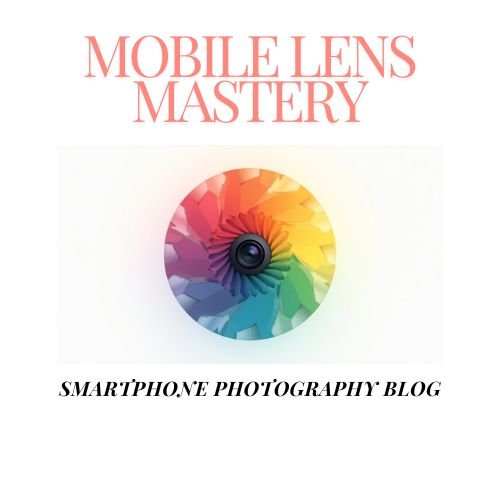
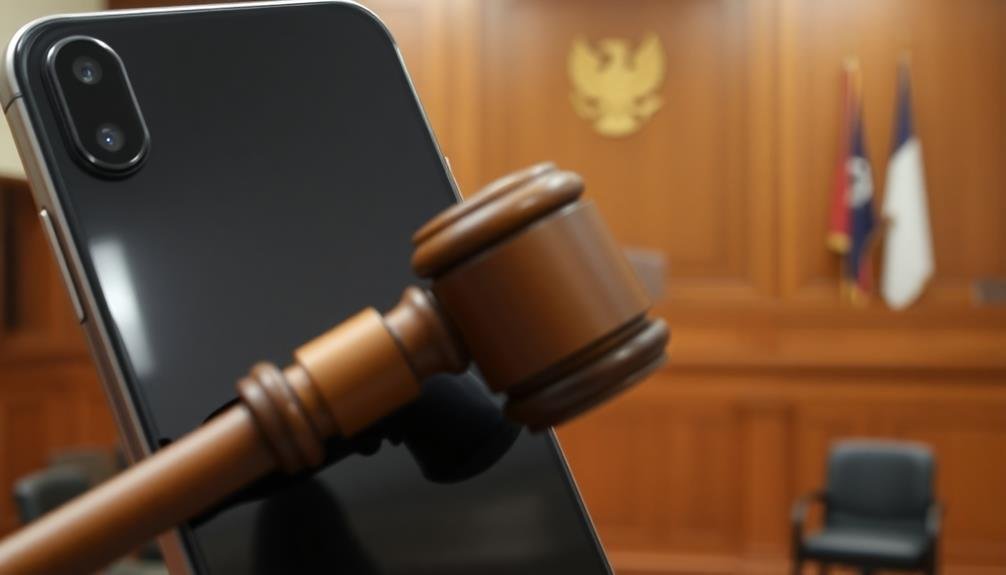
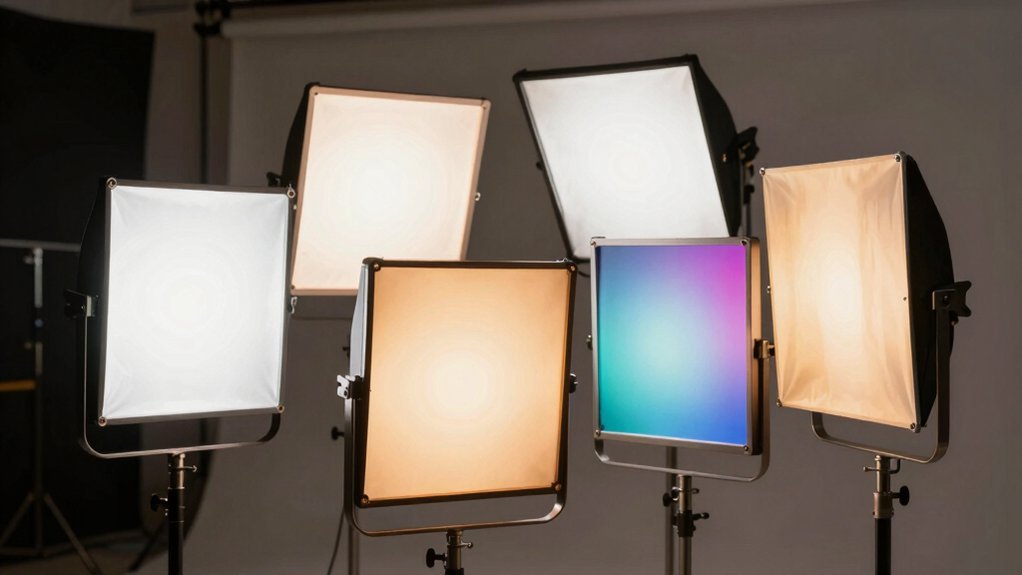
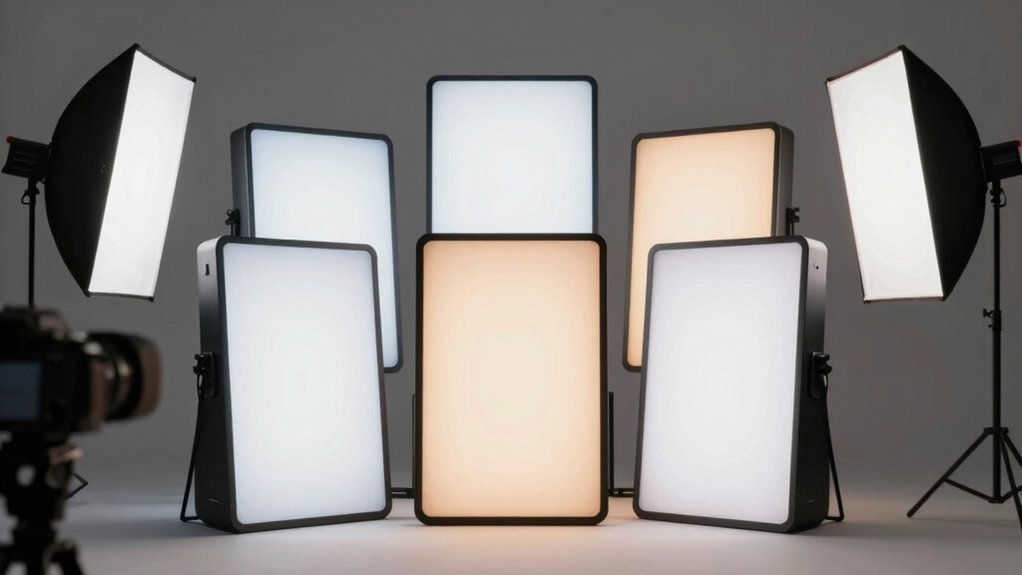
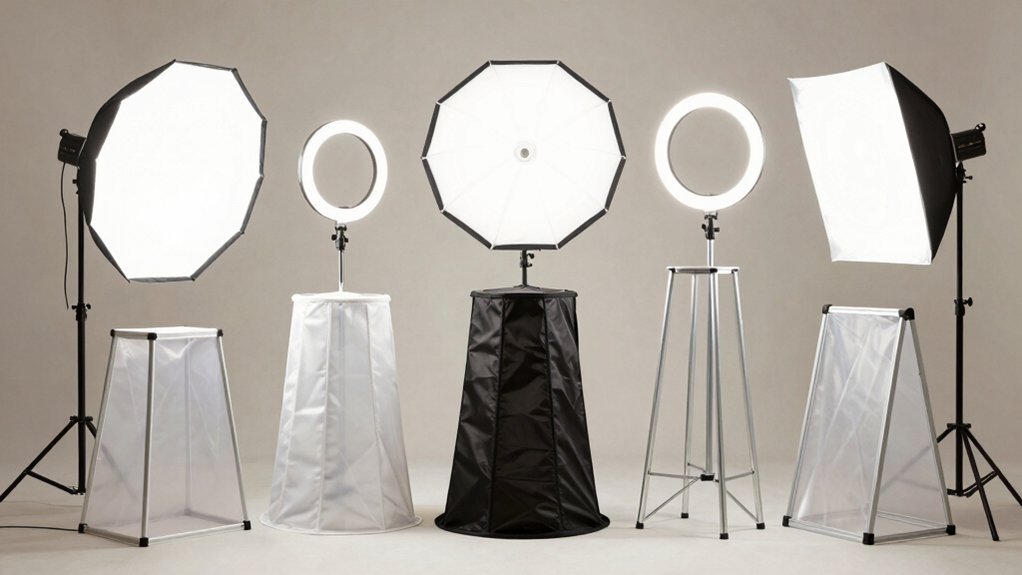
Leave a Reply